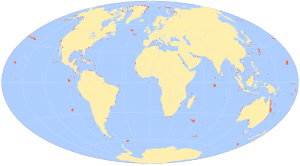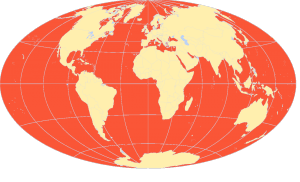Deborah Rowan Wright – The Principle of Worldwide Marine Protection – Nov 2012
10th November 2012A Paradigm Shift in our View of the Sea
The Principle of Worldwide Marine Protection
Red denotes the areas of sea protected from unregulated destructive commercial practice such as over-fishing, dredging, oil and mineral extraction and shipping.
Imagine if we completely changed the way we think about oceans and seas, and that the present paradigm were turned on its head. Imagine that we forget about the notion of creating marine reserves, – areas of sea which are safe from depletion and ruin. Suppose the situation were reversed so that all oceans and seas were by default protected, and instead, commercial use were only possible if it were well-managed and sustainable.
The underlying principle governing mankind’s use of the sea, would switch from that of exploitation to that of protection. It would be a principle of reason to replace a principle of idiocy, – the Principle of Worldwide Marine Protection, where the health of the marine environment always takes precedence over commercial interests.
This concept, and the principle it engenders, could halt the relentless degradation of our oceans and seas, and it would see them rescued and restored to health and abundance around the world, for the present and the future. Marinet is developing this concept – The Principle of Worldwide Marine Protection – as the most logical basis for a global management strategy throughout the oceans, and we are putting it out into the public arena to trigger constructive debate on the pressing issue of global ocean protection. We invite comment on the idea and contributions to it.
The principle starts from the fundamental position that safeguarding the diversity and the integrity of all seas and oceans is paramount. With the premise that all oceans are by default protected, any industrial and commercial activity would only be permitted by licence to ensure that it neither damaged ecosystems, nor threatened marine life populations.
All marine industries would be strictly regulated, and anyone who exploits the sea would have to prove that their activity is neither harmful nor unsustainable. Whether it be fishing, dredging, oil and gas extraction, shipping or whatever – all commercial users of the sea would at last be accountable and respectful of the natural environment from which they profit.
Parallels already exist. For example, The Convention for the Conservation of Antarctic Marine Living Resources (CCAMLR). CCAMLR was established by international convention in 1982 with the objective of conserving Antarctic marine life. This does not exclude harvesting as long as it is carried out in a sustainable manner and takes account of the effects of fishing on other components of the ecosystem. CCAMLR is an international commission with 25 Members and 10 additional countries have acceded to the Convention. Based on the best available scientific information, the Commission agrees a set of conservation measures that determine the use of marine living resources in the Antarctic. Implementing the conservation measures is the responsibility of each member. This work is assisted by fisheries inspectors, satellite-based monitoring systems, scientific observers and national research programs, and has resulted in management decisions which take account of the impact on the ecosystem and the sustainability of fished resources.
Elsewhere in our oceans though, decades of abuse and greed have bought large areas of our seas to a critical state, with over-fishing and pollution, and with habitats wrecked by devastating fishing gear, and mineral extraction of many kinds.
Existing international laws, such as United Nation Convention on the Law of the Sea (UNCLOSUNCLOS The United Nations Convention on the Law of the Sea, also called the Law of the Sea Convention or the Law of the Sea treaty.) and The Convention on Biological Diversity include measures to protect ocean life. However due to poor compliance and lack of enforcement, they have not prevented the relentless devastation and plunder of the sea by marine industries.
The Principle of Worldwide Marine Protection would be established in law. It could be a development of UNCLOS, which already obliges nation states to protect the marine environment.
With the co-operation of governments and international institutions, (such as the United Nations and the International Tribunal for the Law of the Sea), an amended and more robust UNCLOS would be administered, applied and enforced by a dedicated body comprising multinational representatives – with the aim of managing the world’s oceans and seas in an intelligent, ethical and sustainable way, for the common good of all species, mankind included.
Major change is crucial, beginning with the very way we think of the oceans and seas.
Are they simply to be seen as a source of fish, minerals and oil, there to be ransacked, as fast as possible, without regard to the ruinous impacts, for the benefit of a few?
Or are the oceans to be seen as the breath-taking underwater world which supports an estimated 80% of all life on earth, absorbing billions of tons of carbon dioxide, regulating the climate, providing food and resources for our own survival, and sustaining all life on the planet?
We believe the answer is incontrovertibly clear. Changing the way we see the sea, reversing the paradigm from negative to positive, and establishing the Principle of Worldwide Marine Protection will secure healthy seas and oceans indefinitely.
The Oceans look after us. Now is the time to return the favour.





























3 Responses to “Deborah Rowan Wright – The Principle of Worldwide Marine Protection – Nov 2012”
David Bailey
I totally agree with everything you say Deb. You’ve hit the nail right on the head. The only problem is we are up against an inadequate and out dated political system that puts the interests of short term commercial interest before that of the environment and people. I am led to believe that the only way we are going to achieve positive change is to completely change the political system. That is where the Green Party comes in. The more of us that vote Green, the greater the chances of achieving environmental success.
Pat Gowen
Was it you, Deb, holding the MARINET Banner aloft heading the Fishfight demo ?
Only a brief two second appearance on the lunchtime ITN News, with nothing seen on BBC or Ch.IV, but nevertheless highly effective showing with impact, the first time that MARINET has had a showing on TV to my knowledgeand demo. I didn’t even know we had a banner !
Norma and I were with you in spirit, sadly not in person as the health problems that come with aging have dictated that our marching days are long over.
Let’s hope we can get more of such in the future and so achieve a wider recognition beyond our membership.
Pat Gowen
Well said, well written and well explained, Deb. Thank you for an excellent contribution to the debate.
I can’t see that anyone reading your treatise here can possibly disagree with anything you have pointed out.
But the problem is – how do we get it out to those vested interests who benefit from the exploitation of our seas and their powerful lobby ?
We must all try to use the media as much as possible to take up the issue and so bring it to wide public concern.
Letters to our MP’s and MEP’s, newspaper editors and getting the facts and their importance out by the means of TV and Radio would seem to be the best path.
Regards, best wishes and power to your pen.
Pat Gowen
Best wishes and regards,
Pat